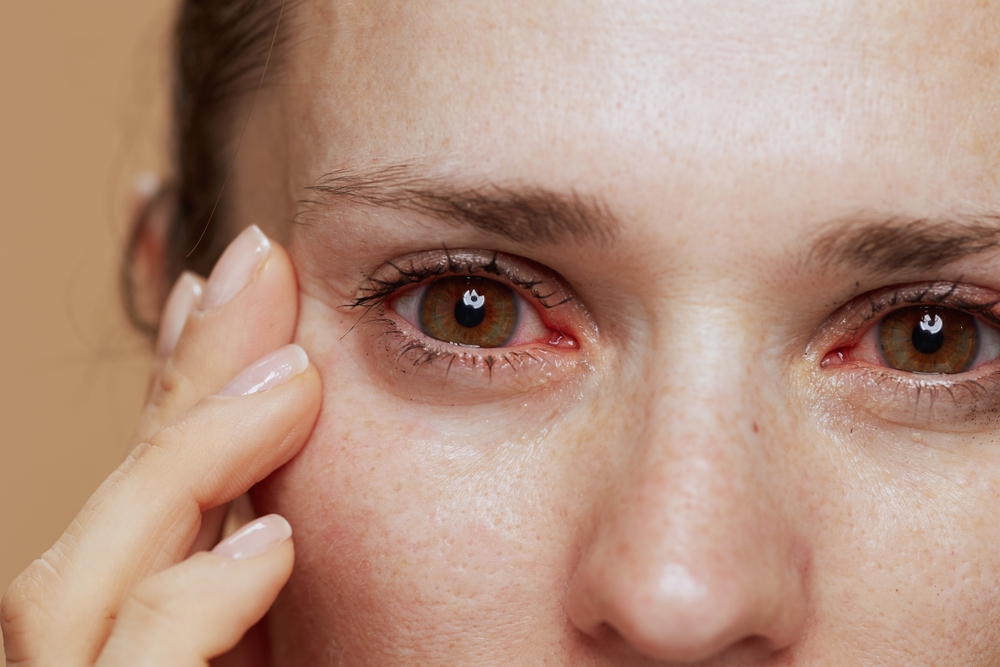Posted by: Associates in Ophthalmology (NJ) in Eyes

Dry eye syndrome is a common eye condition that affects millions of people. It occurs when the eyes do not produce enough tears or when the tears evaporate too quickly from the surface of the eyes.
This leads to many different symptoms, including irritation and inflammation, among others. Understanding the causes, risk factors, and symptoms is key to getting a proper diagnosis and relief.
Keep reading to learn more about dry eye, including the most common symptoms!
What is Dry Eye?
Dry eye, or dry eye syndrome, is a problem that affects the tear film that coats the surface of the eyes. The tear film is made up of three layers: an oily lipid layer, a watery aqueous layer, and a mucous layer.
This film keeps the eyes moist and smooth, washes away debris, and contains compounds that protect the eyes from infection. If any part of this film is compromised, it can lead to dry eye.
What Are the Symptoms of Dry Eye?
People with dry eye often experience a number of annoying symptoms, including:
- Itching, burning, stinging sensations in the eyes
- Stringy mucus in or around the eyes
- Increased eye redness, especially later in the day
- Fluctuating vision
- Light sensitivity
- Feeling like something is in your eye
- Trouble wearing contact lenses
If you have dry eyes, you might also experience increased tearing. This may seem counterintuitive, but the eyes try to compensate for the lack of moisture by overproducing tears.
Mild symptoms may come and go, while moderate to advanced dry eye can cause constant irritation and discomfort. Pay attention to when symptoms appear and what makes them better or worse.
Keeping a symptom log can help your eye doctor make an accurate diagnosis.
What Causes Dry Eye?
There are a variety of factors that can cause or worsen dry eye, including:
Age
As you get older, your body produces fewer oils and fluids, such as tears. Tear production generally starts to slow down around age forty.
The oils that coat the tear film also become more viscous with age, resulting in excess evaporation.
Hormones
Changing levels of androgens, estrogen, and other hormones affect the composition of tears. Women are more prone to dry eye during menopause.
Medications
Certain medications can have side effects that cause dryness. Some have properties that can interfere with tear production.
Health Conditions
Autoimmune diseases like lupus, rheumatoid arthritis, and Sjogren’s syndrome cause inflammation that damages tear glands. Chronic conditions associated with eye surface damage increase the risk of dry eye as well.
Environment
Exposure to dry air, windy conditions, smoke, or pollutants can accelerate tear film evaporation. Staring at air vents, frequent air travel in dried-out cabins, and living in arid climates are problematic for many dealing with aqueous deficient dry eyes.
Screens
Reduced blink rates from focusing on digital devices lead to increased evaporation. Computer vision syndrome symptoms arise partially due to tear film instability.
Staring at phones, tablets, monitors, and e-readers is a huge contributing factor to screen-induced dry eye issues.
How Do Eye Doctors Treat Dry Eye?
Depending on the cause and severity of your dry eye, treatment options include:
- Over-the-counter artificial tear drops to provide short-term lubrication
- Hot compresses and lid scrubs to unclog oil glands
- Humidifiers or moisture chamber goggles to protect eyes from drying out
- Oral supplements containing omega-3s or oils to improve the quality of tear film
- Prescription medications to increase tear production
- Surgery to plug tear ducts or block nerve signals causing eye dryness
The key is finding the right treatment plan tailored to your specific case and needs. Work closely with your eye doctor at Associates in Ophthalmology to both alleviate symptoms and address any underlying issues causing your dry eye.
Are you experiencing dry eye symptoms? Schedule an appointment at Associates in Ophthalmology in Livingston, NJ, today!

